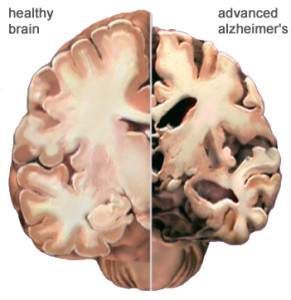According to the Alzheimer’s Association, an estimated 5.3 million Americans of all ages have Alzheimer’s or another form of dementia. Nearly 1 in every 3 seniors dies of Alzheimer’s or dementia. This website also reports that it is the only one of the top ten death causes in America that “cannot be prevented, cured, or slowed”. However, a report out of UCLA, may contradict this statement.
Despite the fact that this disease is still considered “incurable”, researchers are looking to discover the next best thing, reversing symptoms. In this study, Dale Bredesen and his team studied 10 patients who ranged from 55 to 75 years old, all with various stages of Alzheimer’s. They were put through an intense program that consisted of “maintaining optimal gastrointestinal health, strategic fasting in order to normalize insulin levels, maintaining desired levels of vitamin D in the bloodstream, and making use of DHA supplements in order to repair broken connections in the brain” as reported in an article by Medical Daily. This therapy was based on the underlying pathogenesis of Alzheimer’s. Pathogenesis simply means the biological mechanism that lead to the diseased state. The goal of the therapy is to “achieve metabolic enhancement for neurodegeneration” according to Bredesen’s published article.
After a few months of treatment, 9 out of 10 patients claimed to notice their cognition returning to normal or improving slightly. One 60-year-old woman reported no improvements, but she was in late stages of the disease when she began the trials. This causes me to wonder if those in the later stages are “too far gone” in a sense to benefit from this therapy. Such a restriction is unfortunate for those already in the later stages, but if the therapy is proven successful, those diagnosed from here out will reap the benefits. Six of the patients were struggling with their jobs and had to stop working at the time of this trial, but with the therapy they were able to continue working with improved cognition or return to work. The longest patient follow-up was two and a half years from initial treatment and improvements in cognition were being maintained. 
Bredesen put the patients through a number of tests and found between 10 and 24 problems that need to be corrected in each patient. He claims that while drug companies are able to fix some of these problems, the better option may be to try to tackle many of the factors one-by-one. Like any study, especially one that is new, this one has it’s downsides. The official report stated, “The significant diet and lifestyle changes, and multiple pills required each day, were the two most common complaints of the patients”. However, because their condition was considered “untreatable” they were willing to stick with the process to the best of their ability because of the chance of improvement in their health.
While these tests were merely anecdotal, a controlled clinical trial will more than likely result. However, the therapy itself can continue to be improved upon as well. Dredesen is clearly aware of this as most researchers should be. Nothing is perfect the first time and there will always been improvements that can be made. Their report even states, “It is recognized that the system described here is an initial system, one that is likely to benefit from optimization”. I think a larger test sample would be needed in a clinical trial as well as controlling for the levels of progression of the disease in each patient. There would also need to be some form of monitoring in order to prove that they are sticking to the therapy regime. While such a study would be very involved and need to be planned out accordingly, this potential improvement for Alzheimer’s patients is incredibly uplifting considering their disease is considered “incurable”.

Alzheimer’s is a disease that I am starting to hear more and more about. It is great to see that there are researchers taking steps to help people with Alzheimers to decrease its effects. The first study you mentioned was interesting, since one woman reported no change. I think it would be important to consider her age, as well as what stage of Alzheimer’s she had. Her age could be a confounding variable, if she is considerably older than the others in the study.
I found that Tacrine has been proven successfully treat Alzheimer’s. There were only 28 people who were included in this open label study, but they used many different tests to asses their improvement. This made me feel as though this must be necessary to see changes in the brain, since both studies used multiple tests. One difference though, would be that Bredesen only tested 10 people, while Kaufer and his team tested 28. I feel as though the bigger the sample size, the more sound the results are. I think that Bredesen changed too many things at once, like controlling insulin levels while at the same time maintaining levels of vitamin D. One of those things could have been no help, but we will not know since he changed them all at once. Kuafer only gave Tacrine to patients, so when there were positive affects, it was clear what caused them. Lastly, Tacrine could have some how been involved with Bredesen’s study indirectly. Maybe the vitamins he gave his patients could have triggered the production of tacrine in the body, therefore making there thinking clearer.
Tacrine study: http://jgp.sagepub.com/content/9/1/1.short